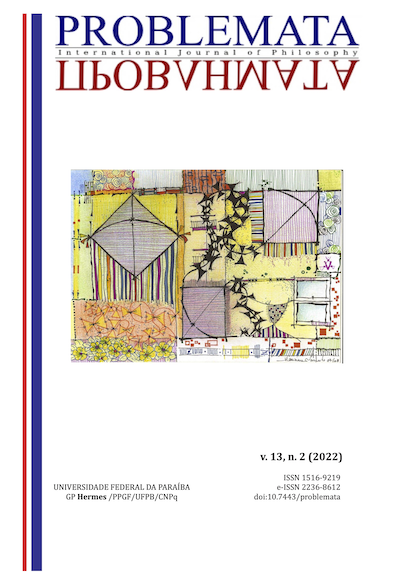THE ANTI-DEMOCRATIC IMPLICATIONS OF TRANSHUMANISM
DOI:
https://doi.org/10.7443/problemata.v13i2.61232Keywords:
Francis Fukuyama, Transhumanism, Democracy, End of historyAbstract
The objective of this paper is to present the thesis of the Japanese-American philosopher and economist Francis Fukuyama, known as the “end of history”, to reflect on the central argument of this thesis that transhumanism represents a problem for democracy. Therefore, a conceptual analysis will be carried out, based on selected excerpts, of Fukuyama's works entitled The end of history and the last man, Our posthuman future and “Transhumanism”. According to Fukuyama, as the results of biotechnology increasingly allow humans to control their own evolution, they may also allow humans to alter their own nature. Thus, Fukuyama argues that a possible result of altering the human nature of some individuals could be radical inequality, which would put liberal democracy at risk. Based on Fukuyama's argument, we seek to reflect on the possible negative implications of transhumanism for democracy in general.
Downloads
References
ANDERSON, P. O fim da história – de Hegel a Fukuyama. Rio de Janeiro: Jorge Zahar Editor, 1992.
BABICH, B. Nietzsche’s post-human imperative: on the “All-too-human” dream of
transhumanism. The agonist, a Nietzsche circle journal, Londres, v. 4, n. 2, p. 1-39, 2011. Disponível em: http://goo.gl/U22yVH. Acesso em: 24 out. 2021.
BOSTROM, N. A history of transhumanist thought. Journal of evolution and technology, Boston, v. 14, n. 1, p. 1-25, 2005. Disponível em: https://ora.ox.ac.uk/objects/uuid:55ab57ec-70d0-4b93-b058-0d7f57167cc2. Acesso em: 24 out. 2021.
CAMILO, B. O problema do cientificismo. 2018. Tese (Doutorado em filosofia) – Programa de pós-graduação em filosofia, Universidade Federal do Ceará, Fortaleza, 2018. Disponível em: http://www.repositorio.ufc.br/handle/riufc/39432. Acesso em: 24 out. 2021.
DREYFUS, H. L. On the internet. Londres: Routledge, 2009. Disponível em: https://cryptome.org/2013/01/aaron-swartz/On-the-Internet.pdf. Acesso em: 24 out. 2021.
DREYFUS, H. L. What computers still can't do: of artificial reason. Nova York: Harper & Row, 1972. Disponível em: https://monoskop.org/images/c/ce/Dreyfus_Hubert_What_Computers_Cant_Do_A_Critique_of_Artificial_Reason.pdf. Acesso em: 24 out. 2021.
FUKUYAMA, F. O fim da história e o último homem. Rio de Janeiro: Editora Rocco, 1992.
FUKUYAMA, F. Our posthuman future: consequences of the biotechnology Revolution. Nova York: Farrar, Straus and Giroux, 2002.
FUKUYAMA, F. Transhumanism. Foreign policy, Washington DC, n. 144, p. 42-43, set./out. 2004. Disponível em: https://philosophy.as.uky.edu/sites/default/files/Transhumanism%20-%20Francis%20Fukuyama.pdf. Acesso em: 24 out. 2021.
GROSSMAN, L. 2045: the year man becomes immortal. We're fast approaching the moment when humans and machines merge. Welcome to the singularity movement. Time, Nova York, não paginado, 10 fev. 2011. Disponível em: http://content.time.com/time/magazine/article/0,9171,2048299,00.html. Acesso em: 24 out. 2021.
HARRIS, J. Enhancing evolution. The ethical case for making better people. Princeton: Princeton University Press, 2007.
HUGHES, J. J. Democratic transhumanism 2.0. Hartford: Public Policy Studies, 2002. Disponível em: http://www.changesurfer.com/Acad/DemocraticTranshumanism.htm. Acesso em: 24 out. 2021.
KOJÈVE, A. Introdução à leitura de Hegel. Rio de Janeiro: Contraponto: EdUERJ, 2002.
KURZWEIL, R. The singularity is near: when humans transcend biology. Minion: Penguin Group, 2005. Disponível em: http://www.grtl.org/Singularity-Is-Near.pdf. Acesso em: 24 out. 2021.
MERCER, C and T. J. Trothen. Religion and transhumanism: the unknown future of human enhancement. Santa Bárbara: Praeger, 2015.
MUEHLHAUSER, L. Intelligence explosion FAQ. Machine intelligence research institute, Berkeley, v. 1, n. 20, 2013. Disponível em: https://intelligence.org/ie-faq/. Acesso em: 24 out. 2021.
NIETZSCHE, F. W. Crepúsculo dos ídolos (ou como filosofar com o martelo). In: LEBRUN, G. (ed.). Friedrich Nietzsche: obras incompletas. São Paulo: Nova Cultural, 1999. p. 371-390. (Os pensadores; 32).
OLIVEIRA, J. R. Nietzsche e o trans-humanismo: em torno da questão da autossuperação do homem. Kriterion, Belo Horizonte, v. 57, n. 135, p. 719-739, 2016. Disponível em: https://www.scielo.br/j/kr/i/2016.v57n135/. Acesso em: 24 out. 2021.
SORGNER, S. Zarathustra 2.0 and beyond: further remarks on the complex
relationship between Nietzsche and transhumanism. The agonist, a Nietzsche circle
journal. Londres, v. 4, n. 2, p. 1-46, 2011. Disponível em: http://goo.gl/U22yVH. Acesso em: 24 out. 2021.
STOCK, G. Redesigning humans: choosing our children’s genes. London: Profile,
Downloads
Published
Issue
Section
License
Copyright (c) 2022 Bruno Camilo de Oliveira

This work is licensed under a Creative Commons Attribution 4.0 International License.
Authors who publish with this journal agree to the following terms:
- Authors retain copyright and grant the journal right of first publication with the work simultaneously licensed under a Creative Commons Attribution License that allows others to share the work with an acknowledgement of the work's authorship and initial publication in this journal.
- Authors are able to enter into separate, additional contractual arrangements for the non-exclusive distribution of the journal's published version of the work (e.g., post it to an institutional repository or publish it in a book), with an acknowledgement of its initial publication in this journal.
-
- Authors are permitted and encouraged to post their work online (e.g., in institutional repositories or on their website) prior to and during the submission process, as it can lead to productive exchanges, as well as earlier and greater citation of published work (See The Effect of Open Access).





